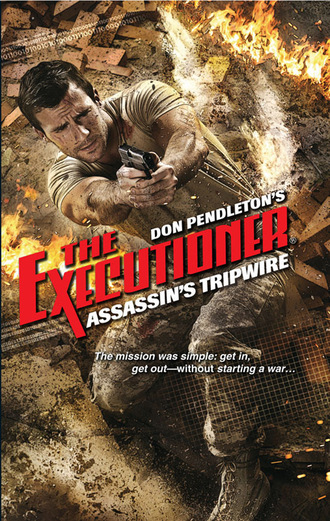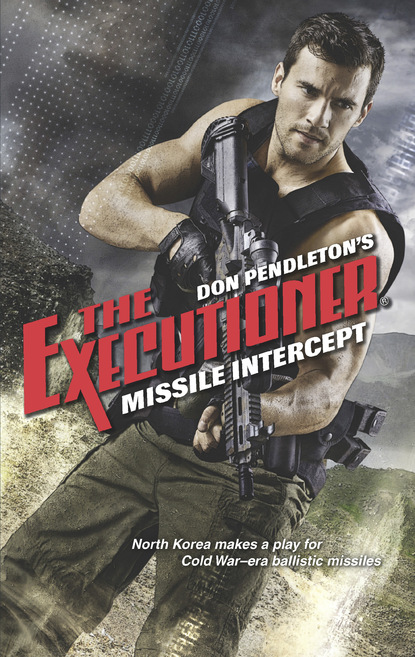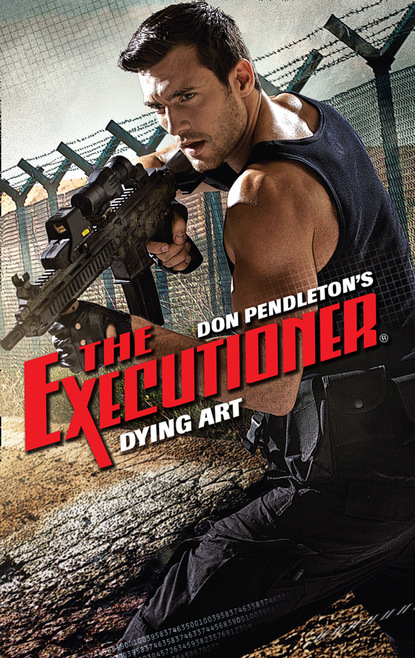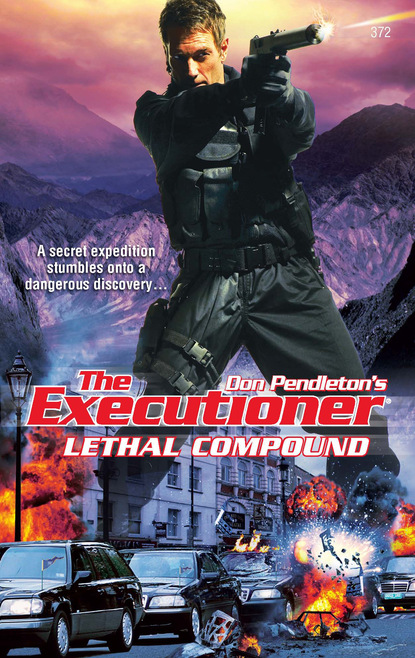
Полная версия
Assassin's Tripwire
“We have money,” Yenni interjected. “You sell weapons.” Her tone seemed to say this should be the end of any debate on the matter. Bolan would have grinned if he was not keenly aware of the iron in Khasky’s eyes.
“I do not think you understand.” Khasky’s gold-toothed grin grew wider. From under the table he produced an ancient tape recorder.
“What is this?” Yenni asked. Bolan shot her a glance. It was best not to ask more questions than necessary when you had a blade at your throat, figurative or otherwise.
“I have conducted business here for a long time,” Khasky said. “Things were much better before Hahmir took over. My profits are down. My people suffer. The Wolf’s patrols do not come near Al Tabkah. They know better now. But this did not come without a price. Many of my best fighters died.”
Bolan risked a reply this time. “That has nothing to do with us,” he said.
“Does it not?” Khasky asked. He pressed the play button on the tape recorder with one fat finger.
“…American interference,” said a distorted voice. “Highest alert. The Americans seek the weapons.” The voice continued, but was too garbled to understand. The words had been in English but with a heavy accent. That was curious.
“We do not know who sent this,” Khasky said. “We recorded it from the radio. Now you, Yenni, bring me an American.”
“He is Canadian,” she said.
“And I am king of this land,” Khasky replied. His evil grin never wavered. “No. He is an American. He is an American come to find Hahmir’s American weapons. And this will not do. For if Hahmir and the Wolf secure these weapons, those who believe as I do will suffer more. And my control of Al Tabkah may be broken. I cannot allow this.”
They were loyalists. Whoever had tipped them off—possibly the same person who had told the Wolf’s men to expect an incursion in Bolan’s drop zone—wanted to make sure Bolan didn’t find those weapons. Was it the Wolf himself, pursuing his own agenda? Was it some other force? Was Hahmir hiding the weapons and claiming they were stolen, in order to deceive his newfound Western allies? There was no way to tell yet.
Before he could learn more, Bolan was going to have to survive the next thirty seconds.
Khasky drew a machete from under the table, where it had probably been in a sheath affixed beneath.
“Khasky, this is a mistake,” Yenni said. “We will pay you double.”
“Kill them,” the fat man told his guards.

4
Hal Brognola watched his .45-caliber Glock disappear into the metal tray and reappear on the other side of the blast-reinforced Plexiglas. The stone-faced attendant logged the weapon into his computer, nodding the big Fed through the door at the other end of the chamber. That door was tempered steel and opened on hydraulic pistons. Brognola ducked his head to clear the upper edge, mindful of the teeth that meshed with slots in the floor, then waited for the door to close behind him.
The hardened black site, a stone’s throw from the Potomac in the subbasement of a nondescript government building, employed a level of security that made Guantánamo Bay look like a summer camp. No weapons were allowed except those wielded by the staff. Potential recruits were drawn from the same pool of men who eventually became the blacksuits of Stony Man Farm. The counter-terrorism facility, hidden in plain sight in the Blue Ridge Mountains of Virginia, used them for its day-to-day operations and to occasionally assist Mack Bolan or the action teams when needed. The blacksuits were seasoned police officers and military personnel, extremely capable. Looking at these guards, Brognola did not have to remind himself that he was dealing with equally capable professionals. They moved like panthers and they carried their M4 rifles with easy familiarity.
The public would go apoplectic if people knew that a “black prison” was operating right in Wonderland, a cab ride away from the Capitol. Still, sites like these were necessary. As much as Brognola hated to skirt the Constitution, he was forced to do so on a regular basis. The nation’s enemies didn’t follow the rules, nor could he afford to have his hands bound by idealism. There were times when it was necessary to go the black-bag route.
Today, for instance, there was the ugly business of interrogating the man who’d tried to kill the President.
Brognola carried in his hands the complete dossier Intelligence had compiled on the man, who’d given only one name: Eidra. Calling it that—complete—oversold the case. They knew very little on Eidra himself. His prints weren’t in the database, and while they could run his DNA, it would take weeks to get a match. Interpol had nothing on him, nor did the Farm’s supersecret compiled files. The worst part was that every time Brognola stared at the man, he felt as if he was missing something. It was a nagging feeling at the back of his mind, as if he’d walked into a room to get something and then forgotten what he’d come to find.
The guards walked him down several long corridors, which switched back on themselves and were, he swore, deliberately designed to be confusing. The halls were a uniform battleship gray, the doors steel with barred, inset windows. The bars protected bullet-resistant Plexiglas. Specifically, they prevented prisoners from kicking the square and popping the pane of high-tech Plexi straight out of the door. Each window was coated with a translucent film that prevented prisoners from seeing out and observers from seeing in…unless they wore a pair of specially coated sunglasses that somehow defeated the film. Brognola had been briefed on how the tricky little optics effect worked and had concluded he did not care. The guards with him were wearing those shades, which looked like the type of thing a snowboarder might wear. It didn’t make them seem any friendlier.
Brognola drew a deep breath and wished he hadn’t more or less given up actually smoking cigars. These days he chewed them more often than not…when he wasn’t chewing antacids to counteract the stress of his job. Today was worse than usual, because he had to steel himself for some of the most brutal work a man in his position was likely to supervise.
It wasn’t called torture.
And, honestly, it wasn’t torture, but that didn’t mean it wasn’t intensely uncomfortable for the subject. Brognola didn’t like it and didn’t enjoy watching it, but again, some things were necessary.
And once more, there was that nasty little voice nagging at him. What was it? What was he missing? He looked at the file again as he walked, shuffling through the photos of Eidra, the description of his arrest and the appended analysis of the security flaw that had allowed him to get so close to the President.
In theory, security at the meet and greet with Hahmir had been as tight as Wonderland got. There should have been no way for a random national to penetrate the concentric rings of the security cordon, but Eidra did. He’d posed as a member of the press. When it came time for the dog-and-pony show after the President and Hahmir had done a lot of talking for the television cameras, Eidra had stepped forward.
On the table next to the media dais had been a cup of those stupid pens politicians used to sign bills one letter at a time. One of the Man’s people had scheduled a ceremony to sign some piece of legislation or other after the main diplomatic fanfare was over. Eidra had moved up to the microphone cluster, sidestepped as if he’d tripped and then dived for the pens, coming up with one in his fist like some kind of dagger.
He’d been within three steps of the podium on which the President stood. Eidra had covered that distance in fractions of a second, diving for the Man as if he would bury that pen in his neck.
Hahmir had stepped in front of the President.
The Syrian leader had taken a stab to the shoulder before the Secret Service tackled Eidra. Still more operatives hustled all the dignitaries to separate armored safe rooms. The place had been utter chaos for the next hour, as the finger pointing and speculation began. That was when the talk of Hahmir-as-hero had started. The idea stuck, and by the time the President and Hahmir had called their joint press conference later that day, the two of them were pretty chummy.
Hahmir’s wound was superficial and, as part of covering up the whole incident in the press, the Syrian leader had agreed not to speak of it. Much as the media loved a hero story, it would be far too ugly if word got out that an unauthorized individual had gotten so close to the President and visiting foreign dignitaries. It was that much worse that it all happened on White House property. And while the President was not stupid, he very much wanted to believe that Hahmir’s good faith was genuine.
Which left only the mystery of Eidra.
A lone nut sneaking into the media pool was not so far-fetched. Eidra need not be anything or anyone more sinister than a crazy person. After all, there was no shortage of nuts who wanted to take a poke at the President.
But Eidra, at least at first glance, appeared anything but nuts…and their attempts to investigate his background had met with enough obstacles that Brognola was becoming very suspicious. Eidra was a ghost. Someone didn’t disappear that effectively unless a skilled cybertechnology team was backing him up, and that meant the involvement of some government or terrorist organization.
Except for speaking his name, Eidra had not uttered another word. He’d given them nothing to go on. They didn’t know his nationality and they weren’t sure of the derivation of Eidra itself. So far, while imprisoned, he had eaten mechanically when food was put in front of him, slept when he was allowed to sleep, and made absolutely no comment, protest or action of any kind with regard to his incarceration.
It wasn’t natural. Brognola was no stranger to conducting interviews and interrogations from within the deepest, darkest government holes imaginable. When a man dropped off the world and into a place like this, he went through predictable phases. Sure, those phases didn’t happen in the same order with everyone, and they weren’t always of the same duration, but you could count on some degree of defiance, bargaining, despair… There were a few other shifts, but what they all had in common was that the prisoners reacted. They made noise. They demanded to see someone in authority, perhaps to speak with their own governments. They pleaded. Sometimes they cried. To just sit, stand or eat without making any comment at all… It wasn’t natural.
It all added up to a picture Brognola didn’t like. That was why he’d come here today. He wanted answers. He wouldn’t be able to sleep until he got them. The President seemed to think the matter was over, with Eidra imprisoned and the Syrians now nominal allies. But the moment the weapons shipment had gone missing, Brognola knew there was more to it all than this simple narrative.
Finally, they arrived at the door to Eidra’s cell. They were on the lowest level of the black site here. That was fitting, Brognola supposed. No one had ever escaped from this place. No one ever would. That was because the men who guarded it would kill Eidra, Brognola and even themselves if that was what it took to keep Wonderland secure from the monsters lurking behind these locked doors.
“Open it,” said the man from Justice.
The guards nodded. At Brognola’s order, they opened Eidra’s cell door. The interior was much like any cell in any prison across America, with one exception: this one had a cot, a stainless-steel toilet with no seat and a steel table with two steel chairs. The table and chairs were cemented to the floor. No amount of time and effort would set them free, not without power tools. The reason the cell boasted a table and chairs was because here, in the black prison, every cell was also an interrogation room.
“Do you want him chained?” one of the guards asked. Eidra, sitting on his bunk, didn’t look up.
“No,” Brognola said. He supposed he was being macho, proving to himself that a spindly punk like Eidra couldn’t take him barehanded. Brognola might be aging and he might spend his days riding a desk, but he’d be damned if he was going to shrink in fear behind these stevedores while a scarecrow like Eidra stared him down. The prisoner could not possibly weigh more than a hundred and thirty pounds. He was one of the thinnest men, for his height, that Brognola had ever seen.
“I’ll get the bucket,” one of the guards said. He let himself out of the cell. Brognola nodded to the other one, then sat down at the table. The remaining guard went to the bunk, clamped one beefy hand on Eidra’s shoulder and guided him up and over to the interrogation table. Eidra sat across from Brognola without prompting.
“You heard?” the big Fed said. “The bucket is for you. We’re going to waterboard you. ‘Enhanced interrogation,’ they call it. It’s going to feel like you’re drowning. You won’t be. You’ll stay alive and awake for as long as we keep you that way. And you’ll get to feel every excruciating moment of it, for as long as we say you do.”
Eidra looked up at Brognola and actually met his eyes. Then the corners of his mouth turned up. He smiled. Brognola did his best to hide his surprise.
“Eidra,” the prisoner said.
“The name, rank and serial-number bit, eh?” Brognola said. “Okay. That’s fine. Nobody thinks they’re going to break the first time.”
Eidra leaned forward on the table. Brognola told himself to be wary. If the man tried to head-butt him or bite him, he would be ready for that. He had seen people blinded, had seen them nearly lose noses, when victimized by similar maneuvers.
“Eidra,” the prisoner said again. He leaned back and smiled even more smugly.
The other guard returned with a cart containing the items necessary to get the job done. “It’s time,” Brognola said. “I just wanted to see if you had anything to say before we began.”
Eidra shook his head, which was remarkable of itself. He crossed his arms, still defiant. And in that moment, in that second of familiarity, Brognola felt as if he’d been hit by lightning.
“Damn,” Brognola said.
The guards looked at each other and then at Brognola. The man from Justice wasted no time explaining, however.
“Secure the prisoner and escort me out. Now.”
The guards were well trained. They didn’t ask questions or delay him. They just did as he ordered, discarding the notion of conducting the interrogation and making sure he got where he needed to go. A driver behind the wheel of a For Official Use Only Chevy Malibu raced him through the streets of Wonderland, and Brognola was soon shoving open the door of his own office.
Once behind his desk, he opened his secured, scrambled laptop and fired up his connection to Stony Man Farm. The head of the Farm’s computer team, Aaron “the Bear” Kurtzman, appeared on the screen through the encrypted connection.
“Hal?” he asked. “What’s wrong? You look like somebody just shot your dog.”
“Bear,” Brognola said, “I need you to call up the Fafniyal file right now. I need to see our highest-resolution pictures of the Wolf. The ones I was looking at when we prepared Striker’s dossier for the mission.”
“You got it,” Kurtzman said. His fingers flew across the keys, faster than Brognola would have thought possible if he hadn’t seen it many times before. The files began appearing on Brognola’s screen, served up by the computers at the Farm.
“No,” he said. “Next. Next. Not that one.” With each image, he asked for the next one.
Then he saw it again.
“That one!” Brognola said. On the screen, the Wolf was standing with his arms crossed, looking smugly at whatever his attention was focused on.
“Hal?” Kurtzman asked.
Brognola swore. “Bear, give me facial recognition on Eidra, the suspect in the attempted assassination in the Rose Garden.”
“But we ran that,” Kurtzman said. “It didn’t match anything in our files or in the Intelligence databases.”
“Not against the files. Run Eidra against Fafniyal. Give me points of similarity.”
Kurtzman’s expression changed on the pop-up window on Brognola’s screen. He’d realized what the big Fed was after, and it had hit him as hard as it did Hal. “You’re not thinking…” he began.
“I am,” Brognola said.
“Give me five minutes. Maybe ten.”
Brognola waited impatiently as the Stony Man team and computers worked their magic. He was on his third ant-acid pill, working his way through the pack in his jacket pocket, when Kurtzman came back on.
“Well?” Brognola asked.
“You were right. There’s a high probability that the two are siblings. And if the Wolf and this Eidra are, in fact, related…”
“Then Striker is in big trouble,” Brognola said, “because the Wolf’s brother tried to attack the President in order to give Hahmir the chance to ‘save’ the Man.”
“Striker’s radio-silent,” Kurtzman said. “That was your own mission parameter. We can’t reach him and he’s not going to call us.”
“I know, damn it. Don’t you think I know? But we’ve got to find a way. We’ve got to get this information to him somehow.”
“We’re on it,” Kurtzman said. “Farm, out.” The secure transmission ended.
Brognola stood up and went to the window, feeling his stomach roil. He hadn’t wanted to believe it. But he was one of the few people in the Western world who’d actually seen a picture of the Wolf, not to mention the Wolf and his apparent brother. It was no wonder the connection hadn’t been made before. Now that they knew, however, they had to warn Mack Bolan.
Конец ознакомительного фрагмента.
Текст предоставлен ООО «ЛитРес».
Прочитайте эту книгу целиком, купив полную легальную версию на ЛитРес.
Безопасно оплатить книгу можно банковской картой Visa, MasterCard, Maestro, со счета мобильного телефона, с платежного терминала, в салоне МТС или Связной, через PayPal, WebMoney, Яндекс.Деньги, QIWI Кошелек, бонусными картами или другим удобным Вам способом.












